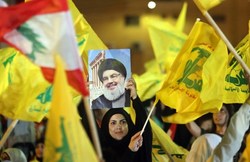 The United States is concerned about Hezbollah's growing popularity and political influence in Lebanon due to the fact that Washington prefers to see a new civil war among different factions in the country, says an academic.
The United States is concerned about Hezbollah's growing popularity and political influence in Lebanon due to the fact that Washington prefers to see a new civil war among different factions in the country, says an academic. RNA - “Hezbollah is legitimate and this is a very positive sign that the Lebanese political system can work within its own context and structures rather than turning into what the United States and Israel would hope for and that is a new bout of sectarian war and conflict,” David Yaghoubian, professor of history at CSU San Bernardinsaid in an interview.
Yaghoubian made the comments in reaction to a US State Department official who expressed concern about the efforts of Hezbollah's political allies that “provide it with top cover and a veneer of legitimacy.”
“The United States and the Zionists lose, should Lebanon gather force internally which would of course bring the members of the current political system and all elements together closer with Hezbollah which already has been and remains a legitimate participating member of the Lebanese government. But this will even extend its role further and I believe that for those that truly seek peace and stability in the region this only can be seen as positive,” he added.
According to Press TV, Lebanon's first parliamentary vote in nine years was held on May 6, with over 500 candidates vying for seats. Turnout was 49.2 percent, according to officials. Hezbollah and its political allies secured over half of the seats.
Hezbollah was founded in the 1980s following the Israeli invasion and occupation of southern Lebanon. The movement waged a long resistance campaign against Zionist forces and pushed them out of southern Lebanon in May 2000. Since then, the group has grown into a powerful military force. Israel also suffered a humiliating defeat from Hezbollah in the 2006 war.
847/940